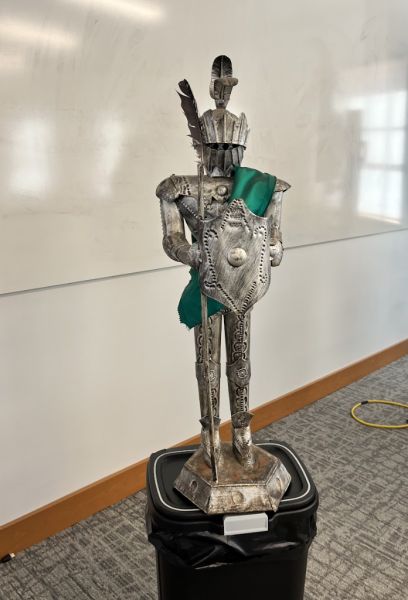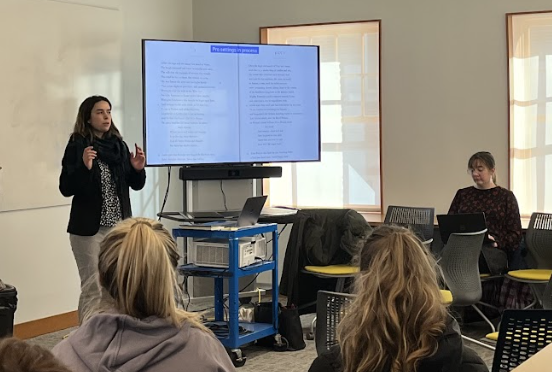The Grappone Humanities Institute hosted a drop-in, collaborative reading of the medieval English poem “Sir Gawain and the Green Knight” on Feb. 16. The event was organized by Professors Georgia Henley (English) and Allie Locking (History). Henley described the poem as “one of the most beautifully written pieces of literature from medieval Britain that is at the same time fairly straightforward for modern readers to connect to.”
“Sir Gawain and the Green Knight” tells the story of Sir Gawain, a knight of King Arthur’s court who accepts a challenge from a Green Knight on New Year’s. Gawain beheads the Green Knight (who survives and rides away on his green horse) but then must honor the bargain and allow the Green Knight to return the blow one year later. Prof. Bouchard, Executive Director of the Grappone Humanities Institute, brought a small knight statue with a green sash to the event to represent the poem’s chivalrous hero.
The public reading lasted for about two and a half hours, running from about 1:30-3:00pm. Professor Henley read the first and last stanzas aloud in the midland dialect of Middle English, and attendees volunteered to read the rest of the poem’s 101 stanzas in turn. Multiple different translations of the text were read from, including translations from J.R.R. Tolkien and Brian Stone, and students were encouraged to follow along in their own books.
Prof. Henley described “Sir Gawain and the Green Knight” as “a story of virtues, cowardice, and moral courage that takes place in King Arthur’s kingdom.” Prof. Bouchard said, “It’s one of the most wonderful, intricately wrought poems in the English language, full of spectacle, adventure, humor, and moral instruction woven into every stanza.” Riley Buchanan ’24 said that the event “opened [her] heart to the beauty of Gawain,” and added that she has “a new appreciation for the color green.”
The Humanities Institute hopes to turn a collaborative reading of the poem into an annual event. Bouchard said that “The Humanities institute will welcome” the annual event around this time of year, since “It makes even mid-Winter feel green.” Prof. Henley observed that hearing this story “read aloud in community makes us feel connected to the medieval past.” Prof. Bouchard called it “the best beheading ever!”



